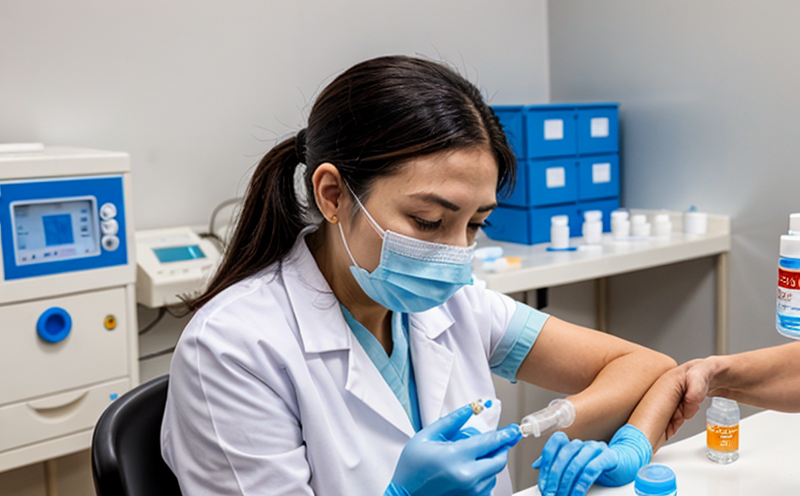ICH Q1B Photostability Testing of Vaccines
The International Conference on Harmonisation (ICH) Guideline Q1B provides comprehensive guidance on ensuring that pharmaceutical products, including vaccines, are stable under various conditions. ICH Q1B specifically focuses on photostability testing for drug substances and finished dosage forms, which is critical in the development and quality assurance of vaccines.
Photostability testing aims to evaluate how a vaccine will behave when exposed to light during its shelf life. This test is essential because light can degrade certain components of the vaccine, leading to potential loss of efficacy or even safety issues. The goal is to understand the photodegradation process and determine the appropriate storage conditions for safe and effective use.
The testing protocol outlined in ICH Q1B involves exposing samples under controlled conditions that simulate real-world exposure to light. This includes using xenon arc lamps, which provide full-spectrum light similar to sunlight. Samples are stored at different temperatures (e.g., 40°C) and humidity levels over extended periods. The test results help identify potential stability issues early in the development process.
The testing procedure typically involves several key steps:
- Sample Preparation: Ensuring that the vaccine is properly prepared according to standard operating procedures (SOPs).
- Light Exposure: Exposing the samples to specific wavelengths of light for predetermined durations.
- Analysis: Conducting various analytical tests to monitor changes in the vaccine's physical, chemical, and biological properties.
- Data Interpretation: Evaluating the results to determine if the vaccine meets stability criteria.
The results of photostability testing are crucial for determining the shelf life of a vaccine. This information is used by regulatory bodies like the US FDA, EMA, and WHO to ensure that vaccines remain effective and safe throughout their intended storage periods.
In addition to ensuring product quality, photostability testing plays a vital role in reducing wastage and ensuring patient safety. By identifying potential degradation early, manufacturers can take corrective actions such as changing packaging or adjusting storage conditions, thereby minimizing the risk of ineffective or unsafe vaccines reaching patients.
Given the critical nature of this test, it is important to choose a reputable laboratory with expertise in pharmaceutical testing. Our lab adheres strictly to ICH Q1B guidelines and uses state-of-the-art equipment to ensure accurate and reliable results. We also offer comprehensive support throughout the testing process, from sample preparation to data interpretation.
Our team of experienced scientists and engineers ensures that every step of the photostability test is conducted meticulously. This attention to detail guarantees that our clients receive high-quality reports that meet all regulatory requirements.
Benefits
The benefits of ICH Q1B Photostability Testing for vaccines are numerous and far-reaching:
- Ensures Product Quality: By identifying potential stability issues early, manufacturers can ensure that their vaccines meet the highest quality standards.
- Promotes Patient Safety: Ensuring product stability minimizes the risk of ineffective or unsafe vaccines reaching patients.
- Saves Costs: Early identification of stability issues helps prevent wastage and reduces costs associated with rework and recalls.
- Achieves Regulatory Compliance: Our tests are conducted in accordance with ICH Q1B guidelines, ensuring that your product meets all regulatory requirements.
- Supports Marketing Authorizations: Positive photostability test results can bolster your application for marketing authorization from regulatory bodies like the FDA and EMA.
- Bridges Regulatory Gaps Globally: Our tests are recognized internationally, ensuring that your product is accepted across different jurisdictions.
These benefits not only enhance the reliability of your vaccines but also streamline the development process, allowing for quicker market entry and broader patient access.
Why Choose This Test
The ICH Q1B Photostability Testing is an indispensable part of vaccine development. Here's why:
- Comprehensive Guidance: The test provides a robust framework for evaluating the stability of vaccines under various light conditions.
- Regulatory Compliance: Conducting this test ensures that your product meets all regulatory requirements, facilitating smoother interactions with health authorities.
- Early Identification: By identifying potential stability issues early in the development process, you can make necessary adjustments before it's too late.
- Cost Efficiency: Early detection of stability problems helps avoid costly rework and recalls down the line.
- Patient Safety: Ensuring product stability minimizes risks to patients, promoting trust in your product.
- Market Readiness: Positive test results can expedite market approval processes, ensuring that your vaccines are available to those who need them most.
Selecting this service ensures that you are adhering to the highest standards of quality and safety. Our team is dedicated to providing accurate, reliable, and timely results, supporting your vaccine development journey every step of the way.
International Acceptance and Recognition
The ICH Q1B Photostability Testing protocol enjoys widespread international acceptance and recognition:
- Regulatory Bodies: The US FDA, EMA, WHO, and other global health authorities accept tests conducted according to this guideline.
- Industry Standards: Compliance with ICH Q1B is a key requirement for vaccine manufacturers aiming to gain market access in various countries.
- Global Trade: Positive test results facilitate international trade by ensuring that your vaccines meet the standards of multiple jurisdictions.
- Consistency: The standardized approach ensures consistent and comparable data across different testing facilities, enhancing trust in the global pharmaceutical community.
The recognition of ICH Q1B Photostability Testing underscores its importance in ensuring the quality, safety, and efficacy of vaccines. By choosing this service, you are aligning your product with international best practices, paving the way for successful market entry and patient trust.





